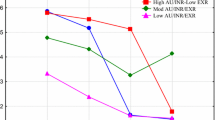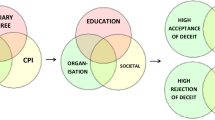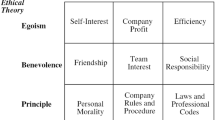Abstract
Jones (1990) described ten workplace behaviors of a dubious ethical nature and determined that the hierarchical position adopted by respondents influenced the perceived acceptability of these behaviors. This measure seems promising, and therefore the purpose of this investigation is two-fold: (1) to explore further the psychometric properties of these ten items; and (2) to examine the role of individual difference variables as correlates of perceived acceptability. In two samples of working people, the Jones items were found to be internally consistent, not obviously subject to range restriction, modestly related to social desirability, largely orthogonal to age and managerial status, but clearly linked with Machiavellianism. The nature of the linkage between perceived acceptability and both sex and the Protestant work ethic differed across the two studies, which underscores the need for future research. Two additional variables worth investigating in such research may be locus of control and equity sensitivity.
Similar content being viewed by others
References
Adams, J. S.: 1963, ‘Toward an Understanding of Inequity’,Journal of Abnormal and Social Psychology 67, pp. 422–436.
Allsopp, J., H. J. Eysenck, and S. B. G. Eysenck: 1991, ‘Machiavellianism as a Component in Psychoticism and Extraversion’,Personality and Individual Differences 12, pp. 29–41.
Beltramini, R. R., R. A. Peterson, and G. Kozmetsky: 1984, ‘Concerns of College Students Regarding Business Ethics’,Journal of Business Ethics 3, pp. 195–200.
Betz, M., L. O'Connell, and J. M. Shepard: 1989, ‘Gender Differences in Proclivity for Unethical Behavior’,Journal of Business Ethics 8, pp. 321–324.
Biberman, G.: 1985, ‘Personality and Characteristic Work Attitudes of Persons With High, Moderate, and Low Political Tendencies’,Psychological Reports 57, pp. 1303–1310.
Blood, M.: 1969, ‘Work Values and Job Satisfaction’,Journal of Applied Psychology 53, pp. 456–459.
Christie, R.: 1970, ‘Scale Construction’, in R. Christie and F. L. Geis (eds.),Studies in Machiavellianism (Academic Press, New York), pp. 10–34.
Comer, J. C.: 1985, ‘Machiavellianism and Inner vs. Outer Directedness: A Study of Sales Managers’,Psychological Reports 56, pp. 81–82.
Cooper, S. and C. Peterson: 1980, ‘Machiavellianism and Spontaneous Cheating in Competition’,Journal of Research in Personality 14, pp. 70–75.
Crowne, D. P. and D. Marlowe: 1960, ‘A New Scale of Social Desirability Independent of Psychopathology’,Journal of Consulting Psychology 24, pp. 349–354.
Eisenberger, R. and D. M. Shank: 1985, ‘Personal Work Ethic and Effort Training Affect Cheating’,Journal of Personality and Social Psychology 49, pp. 520–528.
Fletcher, C.: 1990, ‘The Relationship Between Candidate Personality, Self-Presentation Strategies, and Interviewer Assessments in Selection Interviews: An Empirical Study’,Human Relations 43, pp. 739–749.
Flynn, S., M. Reichard, and S. Slane: 1987, ‘Cheating as a Function of Task Outcome and Machiavellianism’,Journal of Psychology 121, pp. 423–427.
Furnham, A.: 1984, ‘The Protestant Work Ethic: A Review of the Psychological Literature’,European Journal of Social Psychology 14, pp. 87–104.
Gable, M., C. Hollon, and F. Dangello: 1990, ‘Relating Locus of Control to Machiavellianism and Managerial Achievement’,Psychological Reports 67, pp. 339–343.
Gable, M. and M. T. Topol: 1987, ‘Job Satisfaction and Machiavellian Orientation Among Department Store Executives’,Psychological Reports 60, pp. 211–216.
Galli, I., G. Nigro, and G. Krampen: 1986, ‘Multidimensional Locus of Control and Machiavellianism in Italian and West German Students: Similarities and Differences’,International Review of Applied Psychology 35, pp. 453–461.
Geis, F. and R. Christie: 1970, ‘Overview of Experimental Research’, in R. Christie and F. L. Geis (eds.),Studies in Machiavellianism (Academic Press, New York), pp. 285–313.
Geis, F., R. Christie, and C. Nelson: 1970, ‘In Search of the Machiavel’, in R. Christie and F. L. Geis (eds.),Studies in Machiavellianism (Academic Press, New York), pp. 76–95.
Geis, F. L. and T. H. Moon: 1981, ‘Machiavellianism and Deception’,Journal of Personality and Social Psychology 41, pp. 766–775.
Harrell, W. A. and T. Hartnagel: 1976, ‘The Impact of Machiavellianism and the Trustfulness of the Victim on Laboratory Theft’,Sociometry 39, pp. 157–165.
Hegarty, W. H. and H. P. Sims, Jr.: 1978, ‘Some Determinants of Unethical Decision Behavior: An Experiment’,Journal of Applied Psychology 63, pp. 451–457.
Heisler, W. J. and G. R. Gemmill: 1977, ‘Machiavellianism, Job Satisfaction, Job Strain, and Upward Mobility: Some Cross-Organizational Evidence,’Psychological Reports 41, pp. 592–594.
Ho, R. and J. I. Lloyd: 1984, ‘Development of an Australian Work Ethic Scale’,Australian Psychologist 19, pp. 321–332.
Holden, R. R. and G. C. Fedden: 1989, ‘Three Common Social Desirability Scales: Friends, Acquaintances, or Strangers?’,Journal of Research in Personality 23, pp. 180–191.
Huseman, R. C., J. D. Hatfield, and E. W. Miles: 1987, ‘A New Perspective on Equity Theory: The Equity Sensitivity Construct’,Academy of Management Review 12, pp. 222–234.
Jones, T. M. and F. H. Gautschi III: 1988, ‘Will the Ethics of Business Change? A Survey of Future Executives’,Journal of Business Ethics 7, pp. 231–248.
Jones, W. A., Jr.: 1990, ‘Student Views of “Ethical” Issues: A Situational Analysis’,Journal of Business Ethics 9, pp. 201–205.
Kidwell, J. M., R. E. Stevens, and A. L. Bethke: 1987, ‘Differences in Ethical Perceptions Between Male and Female Managers: Myth or Reality?’,Journal of Business Ethics 6, 487–493.
Leary, M. R., P. D. Knight, and B. D. Barnes: 1986, ‘Ethical Ideologies of the Machiavellian’,Personality and Social Psychology Bulletin 12, pp. 75–80.
Levenson, H.: 1974, ‘Activism and Powerful Others: Distinctions Within the the Concept of Internal-External Control’,Journal of Personality Assessment 38, pp. 377–383.
Miles, E. W., J. D. Hatfield, and R. C. Huseman: 1989, ‘The Equity Sensitivity Construct: Potential Implications for Worker Performance’,Journal of Management 15, pp. 581–588.
Mudrack, P. E.: 1989, ‘Job Involvement and Machiavellianism: Obsession-Compulsion or Detachment?’,Journal of Psychology 123, pp. 491–496.
Mudrack, P. E.: 1990, ‘Machiavellianism and Locus of Control: A Meta-Analytic Review’,Journal of Social Psychology 130, pp. 125–126.
Nelson, G. and D. Gilbertson: 1991, ‘Machiavellianism Revisited’,Journal of Business Ethics 10, pp. 633–639.
Nunnally, J. C.: 1978,Psychometric Theory (McGraw-Hill, New York).
Paulhus, D. and R. Christie: 1981, ‘Spheres of Control: An Interactionist Approach to Assessment of Perceived Control’, in H. M. Lefcourt (ed.),Research With the Locus of Control Construct (Academic Press, New York), pp. 161–188.
Paulhus, D. L. and C. L. Martin: 1987, ‘The Structure of Personality Capabilities’,Journal of Personality and Social Psychology 52, pp. 354–365.
Reynolds, W. M.: 1982, ‘Development of Reliable and Valid Short Forms of the Marlowe-Crowne Social Desirability Scale’,Journal of Clinical Psychology 38, pp. 119–125.
Rotter, J. B.: 1966, ‘Generalized Expectancies for Internal Versus External Control of Reinforcement’,Psychological Monographs 80, 1 (Whole NO. 609).
Russell, G. W.: 1974, ‘Machiavellianism, Locus of Control, Aggression, Performance and Precautionary Behaviour in Ice Hockey’,Human Relations 27, pp. 825–837.
Solar, D. and D. Bruehl: 1971, ‘Machiavellianism and Locus of Control: Two Conceptions of Interpersonal Power’,Psychological Reports 29, pp. 1079–1082.
Staw, B. M. and E. Szwajkowski: 1975, ‘The Scarcity-Munificence Component of Organizational Environments and the Commission of Illegal Acts’,Administrative Science Quarterly 20, pp. 345–354.
Terpstra, D. E., M. G. C. Reyes, and D. W. Bokor: 1991, ‘Predictors of Ethical Decisions Regarding Insider Trading’,Journal of Business Ethics 10, pp. 699–710.
Tsalikis, J. and M. Ortiz-Buonafina: 1990, ‘Ethical Beliefs Differences of Males and Females’,Journal of Business Ethics 9, pp. 509–517.
Vitell, S. J., J. R. Lumpkin, and M. Y. A. Rawwas: 1991, ‘Consumer Ethics: An Investigation of the Ethical Beliefs of Elderly Consumers’,Journal of Business Ethics 10, pp. 365–375.
Vleeming, R. G.: 1984, ‘The Nomothetical Network of a Machiavellianism Scale’,Psychological Reports 54, pp. 617–618.
Ward, D. A.: 1986, ‘Self-Esteem and Dishonest Behavior Revisited’,Journal of Social Psychology 123, pp. 709–713.
Weiss, H. M. and S. Adler: 1984, ‘Personality and Organizational Behavior’, in B. M. Staw and L. L. Cummings (eds.),Research in Organizational Behavior (JAI Press, Greenwich, CT), Vol. 6, pp. 1–50.
Author information
Authors and Affiliations
Additional information
Peter E. Mudrack is an Assistant Professor in the Department of Management and Organization Sciences at Wayne State University's School of Business Administration, Detroit, Michigan, 48202, U.S.A. His publications have appeared inHuman Relations andJournal of Organizational Behavior. The author thanks Tony Cerezo, Cindy Hewitt, Mark Holowicki, Mark Lienau, and Shelley St. Amand for assistance with data collection and analysis.
Rights and permissions
About this article
Cite this article
Mudrack, P.E. An investigation into the acceptability of workplace behaviors of a dubious ethical nature. J Bus Ethics 12, 517–524 (1993). https://doi.org/10.1007/BF00872373
Issue Date:
DOI: https://doi.org/10.1007/BF00872373




